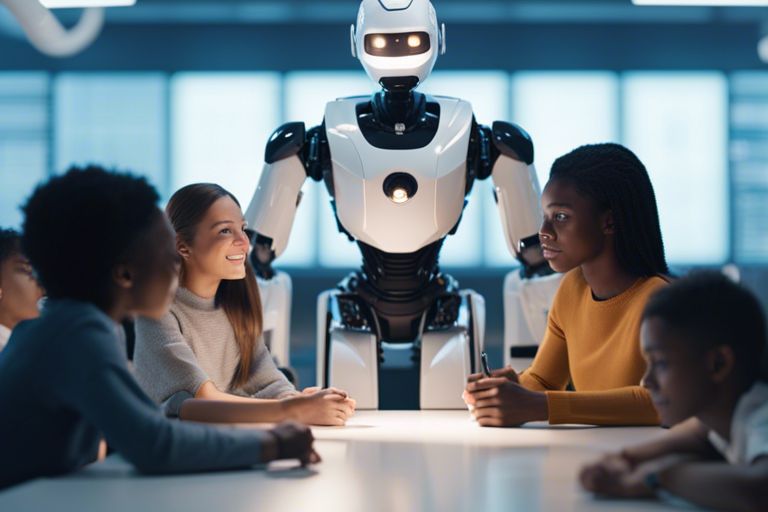Many educators and experts believe that artificial intelligence is revolutionizing the way we learn and teach. From personalized learning experiences to automated grading systems, AI is reshaping traditional education methods. In this blog post, we will explore the impact of AI on the future of education, including its benefits and potential challenges. By delving into how AI is transforming learning, we can better understand the role technology plays in shaping the next generation of learners.
The Current State of Education
Your journey through the educational system has likely involved traditional teaching methods like lectures, textbooks, and exams. While these approaches have been the cornerstone of education for decades, they come with their limitations.
Limitations of Traditional Teaching Methods
State standardized testing often forces educators to teach to the test, focusing on rote memorization rather than critical thinking and problem-solving skills. Additionally, the one-size-fits-all approach may not cater to the diverse learning styles and paces of individual students, leading to disengagement and lost potential.
The Need for Innovation in Learning
Education is at a crossroads, with the rapid advancements in technology and the evolving needs of the workforce shaping the future of learning. Another crucial factor is the increasing globalization, which requires students to develop not only academic knowledge but also cross-cultural competence and adaptability.
The Rise of Artificial Intelligence in Education
If we look at the current landscape of education, we can see how artificial intelligence (AI) is becoming increasingly integrated into various aspects of learning. From personalized learning platforms to intelligent tutoring systems, AI is revolutionizing the way students engage with educational content.
Early Adoption of AI in EdTech
An early adoption of AI in Education Technology (EdTech) has paved the way for innovative applications that cater to individual learning styles and needs. AI-powered algorithms analyze vast amounts of data to provide personalized recommendations, feedback, and support to students. This proactive approach enhances the learning experience by adapting to each student’s pace and comprehension level.
Breakthroughs in Machine Learning and Natural Language Processing
Language processing AI technology has made significant breakthroughs in recent years, enabling more natural interactions between students and learning platforms. Machine learning algorithms can now understand and generate human language, making it easier for students to communicate with AI-powered systems. This advancement is reshaping how students access information, receive feedback, and engage with educational content.
To further advance the field of AI in education, researchers are exploring novel applications of machine learning and natural language processing to enhance virtual learning environments. These advancements hold the promise of creating more dynamic and interactive educational experiences that cater to individual student needs and preferences.
Personalized Learning with AI
One of the most significant ways that artificial intelligence is revolutionizing education is through personalized learning. By utilizing AI algorithms, educators can tailor educational experiences to meet the specific needs of each student, leading to more effective learning outcomes.
Adaptive Assessments and Real-time Feedback
The use of AI in education allows for adaptive assessments that can adjust the difficulty level of questions based on a student’s responses in real time. This means that students are constantly challenged at the right level, leading to more engagement and better retention of information. Furthermore, AI can provide instant feedback to students, allowing them to correct mistakes and improve their understanding immediately.
Customized Learning Paths and Recommendations
The ability of AI to analyze vast amounts of data enables the creation of customized learning paths for each student. By considering factors such as learning style, pace, and areas of strength and weakness, AI can recommend specific resources, exercises, and study materials that are tailored to individual needs.
It’s truly remarkable how AI can pinpoint the exact areas where a student may be struggling and provide personalized recommendations to help them improve. This level of customization in education can lead to significant academic growth and a deeper understanding of the material.
Intelligent Tutoring Systems
Unlike traditional classroom settings, intelligent tutoring systems use artificial intelligence to provide personalized learning experiences for students. These systems can adapt to individual learning styles and pace, offering targeted feedback and assistance in real-time. By analyzing data on student performance, intelligent tutoring systems can identify areas where students are struggling and provide additional support to help them master the material.
One-on-One Support and Guidance
Support: One of the key benefits of intelligent tutoring systems is the ability to offer one-on-one support and guidance to students. This personalized approach can help students stay engaged and motivated, as they receive immediate feedback and assistance tailored to their needs. Whether it’s explaining a concept in different ways or offering extra practice problems, these systems can help students overcome learning challenges more effectively.
Human-AI Collaboration in Education
Guidance: In the future of education, human-AI collaboration will play a crucial role in enhancing learning outcomes. While intelligent tutoring systems can provide personalized support, it’s important to acknowledge the value of human teachers in the learning process. Teachers can interpret the data provided by AI systems, make informed decisions on instructional strategies, and offer emotional support that AI cannot replicate.
With the combination of artificial intelligence and human expertise, students can benefit from a more holistic learning experience that addresses both their academic and emotional needs. This collaboration can empower teachers to focus on individualized instruction, while AI handles tasks such as grading and tracking student progress. Together, they can create a more effective and personalized learning environment for students.
AI-Driven Content Creation
After the advent of artificial intelligence in the education sector, content creation has undergone a significant transformation. AI-driven technologies are revolutionizing the way educational materials are produced, making them more personalized, interactive, and engaging for learners.
Automated Grading and Feedback Systems
Content creation with AI includes automated grading and feedback systems that provide instant evaluation to students, allowing them to understand their mistakes and learn from them efficiently. These systems not only save teachers time but also offer personalized feedback, enhancing the learning experience for students.
Intelligent Textbooks and Interactive Learning Materials
An exciting development in AI-driven content creation is the emergence of intelligent textbooks and interactive learning materials. These resources are designed to adapt to the individual learning pace and style of each student, providing personalized and tailored content to enhance comprehension and retention.
Textbooks supplemented with AI technologies can include interactive features such as videos, quizzes, and simulations, making the learning process more engaging and effective. Students can receive real-time feedback and assistance as they progress through the material, promoting a deeper understanding of the subject matter.
Virtual Learning Environments
All around the world, educational institutions are embracing virtual learning environments powered by artificial intelligence to provide students with a more engaging and interactive learning experience. These digital platforms offer a wide range of tools and resources that cater to diverse learning styles, making education accessible and inclusive for all.
Immersive Experiences and Simulations
Immersive experiences and simulations within virtual learning environments allow students to research into realistic scenarios and apply their knowledge in a practical setting. Through virtual labs and simulations, learners can experiment, make mistakes, and learn from them in a safe and controlled environment, enhancing their critical thinking and problem-solving skills.
Virtual Field Trips and Remote Exploration
Field trips and remote exploration are no longer limited by physical boundaries, thanks to virtual reality technology. Students can commence on virtual journeys to historical sites, museums, and even outer space, gaining firsthand experiences without leaving the classroom. The immersive nature of these virtual field trips sparks curiosity and engagement among students, making learning more memorable and impactful.
Natural Language Processing in Education
Speech Recognition and Language Translation
Keep pace with the future of education by understanding how natural language processing, particularly in the form of speech recognition and language translation, is reshaping the way we learn. AI algorithms can now accurately transcribe spoken words into written text, making it easier for students to access educational content in various formats. Additionally, real-time language translation tools are breaking down barriers to global collaboration by enabling seamless communication among students from different parts of the world.
AI-Powered Writing Assistants and Grammar Checkers
Any discussion on the impact of artificial intelligence in education would be incomplete without highlighting the role of AI-powered writing assistants and grammar checkers. These innovative tools analyze writing for spelling, grammar, and style errors, providing students with instant feedback to improve their writing skills. By integrating AI writing assistants into educational platforms, educators can streamline the feedback process and help students become more effective communicators.
Grammarly and Hemingway Editor are examples of popular AI-powered writing assistants that offer detailed insights into writing quality. These tools not only enhance students’ writing capabilities but also promote critical thinking and creativity in their academic pursuits.
AI-Assisted Special Education
Many educators and experts believe that Artificial Intelligence (AI) has the potential to revolutionize special education by providing personalized support and resources to students with diverse learning needs.
Supporting Students with Disabilities
The integration of AI technology in special education can help students with disabilities by providing customized learning materials, adapting teaching methods to individual needs, and offering real-time feedback. AI-powered tools can assist teachers in identifying learning challenges early on, allowing for timely interventions and support.
Personalized Learning for Diverse Needs
Many students have unique learning styles and requirements, and AI can play a crucial role in tailoring educational experiences to meet individual needs.
Understanding the specific strengths and weaknesses of each student can enable AI systems to create personalized learning paths, recommend relevant resources, and adjust the pace and complexity of lessons. By catering to diverse needs, AI can enhance student engagement, motivation, and overall academic success.
The Role of Teachers in AI-Enhanced Education
Not simply deliverers of content, teachers in AI-enhanced education take on a more dynamic role as facilitators and guides in the learning process. With the integration of artificial intelligence technologies in classrooms, teachers are transitioning from traditional instructors to coaches and mentors.
From Instructors to Coaches and Mentors
For teachers, this shift means moving away from simply imparting knowledge to fostering critical thinking and problem-solving skills in students. AI can handle the more routine tasks of teaching, such as grading assignments and providing personalized feedback, allowing teachers to focus on nurturing creativity and emotional intelligence in their students.
Professional Development for AI-Age Teachers
The professional development of teachers in the age of AI is imperative to ensure they are equipped to leverage these technological tools effectively in the classroom. The rapid advancements in AI require educators to stay up-to-date with the latest trends and best practices in incorporating AI into their teaching methodologies.
From specialized training programs to ongoing workshops and seminars, teachers need continuous support to hone their skills and adapt to the evolving educational landscape. Empowering teachers with the necessary knowledge and resources will enable them to harness the full potential of AI in enhancing the learning experience for their students.

Addressing Concerns and Challenges
Once again, as with any technological advancement, the integration of Artificial Intelligence (AI) in education raises various concerns and challenges that need to be addressed. Two primary areas of focus are job displacement and the future of work, as well as ensuring equity and accessibility in AI-driven education.
Job Displacement and the Future of Work
Any discussion on AI in education inevitably leads to questions about the potential impact on jobs. While AI can automate certain tasks and roles, it also has the potential to create new opportunities and roles that require human skills like empathy, critical thinking, and creativity. It’s crucial for educational institutions and policymakers to adapt curricula and training programs to prepare students for the changing workforce and encourage lifelong learning.
Ensuring Equity and Accessibility in AI-Driven Education
Ensuring equity and accessibility in AI-driven education is vital to prevent the deepening of existing social inequalities. AI systems must be designed and implemented with fairness and transparency in mind, taking into account biases and ensuring that they do not perpetuate discrimination. The use of AI should aim to enhance learning experiences for all students, regardless of their background or circumstances.
The use of AI in education has the potential to bridge gaps and provide personalized learning opportunities for students with diverse needs. By leveraging AI-driven tools, educators can tailor instruction to individual learning styles, preferences, and paces, ultimately improving learning outcomes for all learners.
The Future of Assessment and Evaluation
Despite the traditional reliance on standardized testing in education, the future of assessment and evaluation is being transformed by artificial intelligence. AI technology offers the potential to create more personalized and comprehensive assessments that can capture a student’s true understanding and skills.
Moving Beyond Standardized Testing
With AI, educators can move beyond one-size-fits-all standardized tests and instead leverage adaptive assessments that adjust to the student’s level in real-time. This means that assessments can accurately gauge a student’s strengths and weaknesses, providing targeted feedback to help them improve. This individualized approach to assessment not only fosters a deeper understanding of each student’s learning needs but also promotes a growth mindset by focusing on improvement rather than comparison.
Competency-Based Progression and Micro-Credentials
On the horizon of education is the shift towards competency-based progression and micro-credentials. This model emphasizes mastery of specific skills and knowledge rather than seat time, allowing students to advance at their own pace based on demonstrated understanding. By earning micro-credentials for each skill mastered, students build a more detailed and portable record of their achievements.
Moving towards competency-based progression and micro-credentials not only offers a more flexible and relevant education experience for students but also provides employers with a clear understanding of an individual’s competencies and abilities, streamlining the hiring process.
AI-Driven Education Policy and Governance
Now, with the integration of artificial intelligence in education, there is a pressing need for updated regulatory frameworks and standards to ensure the ethical use of these technologies. Educational institutions and policymakers must work together to establish guidelines that protect student data, ensure fairness in AI algorithms, and promote equity in access to AI-driven educational tools.
Regulatory Frameworks and Standards
To address the challenges posed by AI in education, regulatory frameworks and standards need to be established. These guidelines should outline principles for the responsible use of AI, address potential bias in algorithms, and establish protocols for data privacy and security. By setting clear standards, policymakers can help to foster trust in AI technologies and support their effective implementation in educational settings.
Ensuring Transparency and Accountability
With the increased use of AI in education, ensuring transparency and accountability is paramount. Educators, policymakers, and technology providers must work together to ensure that AI systems are explainable and accountable for their decisions. By promoting transparency, stakeholders can better understand how AI is being used in educational settings and address any potential biases or inaccuracies in the technology.
Accountability in AI-driven education means holding all involved parties responsible for the outcomes of using these technologies. It requires continuous monitoring, evaluation, and improvement of AI systems to ensure that they are serving the best interests of students and promoting equitable learning opportunities for all.
International Cooperation and Collaboration
To truly revolutionize education through artificial intelligence, international cooperation and collaboration are necessary. By working together, countries can share resources, expertise, and technology to improve learning outcomes on a global scale.
Global EdTech Initiatives and Partnerships
Collaboration between governments, educational institutions, and tech companies is crucial in driving innovation in education. Initiatives like the Global EdTech Hub and partnerships between universities across borders are helping to accelerate the development and implementation of AI-driven solutions in classrooms worldwide.
Sharing Best Practices and Research Findings
Practices that have proven successful in one part of the world can be adapted and implemented in others through knowledge sharing and collaboration. By sharing best practices and research findings, educators can learn from each other’s experiences and continuously improve teaching methods and student outcomes.
Sharing the latest research on AI in education, including insights on adaptive learning, personalized tutoring, and data-driven decision-making, can help educators stay informed and make evidence-based decisions in their teaching practices.
To wrap up
Considering all points discussed in “The Future Of Education – How Artificial Intelligence Is Transforming Learning,” it is evident that AI is revolutionizing the education sector. With its ability to personalize learning experiences, provide real-time feedback, and assist teachers in designing effective curriculum, AI has the potential to enhance student outcomes and make education more accessible and engaging.
As we move forward, it is crucial for educators and policymakers to embrace the opportunities that AI presents while also being mindful of the ethical implications and challenges that come with its integration into education. By harnessing the power of AI responsibly and innovatively, we can create a future where learning is truly adaptive, inclusive, and impactful for all students.
FAQ
Q: What is the future of education?
A: The future of education involves the integration of artificial intelligence to transform the learning experience.
Q: How is artificial intelligence impacting education?
A: Artificial intelligence is revolutionizing education by personalizing learning, providing instant feedback, and enabling adaptive learning pathways.
Q: What are the benefits of using AI in education?
A: The benefits of AI in education include improved student engagement, customized learning experiences, and more efficient teaching methods.
Q: Can AI replace teachers in the classroom?
A: While AI can automate certain tasks and provide support to teachers, the human touch and emotional intelligence of educators are irreplaceable in the classroom.
Q: How can AI help students with different learning styles?
A: AI can cater to students with different learning styles by adapting content delivery, providing individualized support, and offering interactive learning tools.
Q: Is AI making education more accessible?
A: Yes, AI is making education more accessible by offering remote learning opportunities, breaking down language barriers, and providing resources for students with disabilities.
Q: What are the potential challenges of using AI in education?
A: Some challenges of using AI in education include data privacy concerns, the digital divide among students, and the need for proper training for educators to effectively utilize AI tools.




